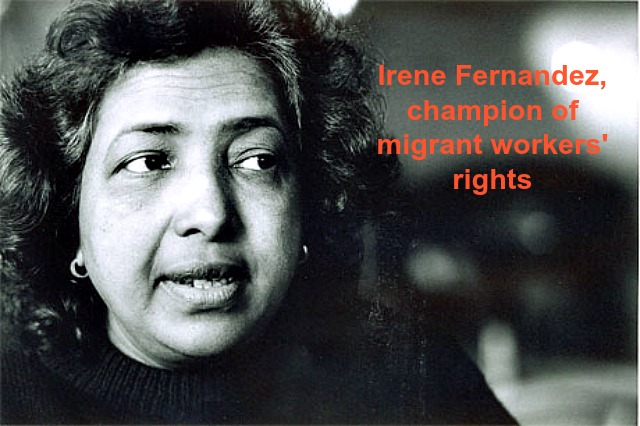Irene Fernandez’s passing a great loss to the cause of migrant workers
The passing of Irene Fernandez due to heart failure on 31 March is a great loss to the cause of migrant workers in the country. They have lost someone who consistently championed their cause.
Apr 02, 2014

By Anil Netto
The passing of Irene Fernandez due to heart failure on 31 March is a great loss to the cause of migrant workers in the country. They have lost someone who consistently championed their cause.
Her organisation, Tenaganita, raised the profile of migrant workers in the country.
But she paid a heavy price in the struggle. In 1995 she published a report titled Abuse, Torture and Dehumanised Conditions of Migrant Workers in Detention Centres, in particular at the Semenyih Detention Centre, based on information supplied to her by journalists.
The following year, she was arrested and charged with “maliciously publishing false news”. After a marathon seven years of trial, Irene was found guilty in 2003 and sentenced to one year’s jail.
When I contacted her as soon as Anwar was convicted of sodomy and there was some doubt as to whether he would be able to contest in the Kajang by-election, she reminded me that she had gone through a similar experience.
She said she was unable to contest in the 2004 and 2008 general elections because of uncertainty over whether her candidacy would be accepted by the Election Commission – even though the execution of her sentence was stayed pending appeal.
It was only towards the end of 2008 that she was acquitted – but by then the watershed general election on 2008 was long over. Her court case thus prevented her from carrying through her activist role into the realm of electoral politics.
But no matter. Her job in Tenaganita kept her and her team, including her sister Aegile, busy – and it was daunting enough. The prolonged court battle must have added to her stress and taken its toll though she never showed it publicly.
Several million migrant workers toil in the country – perhaps four million, maybe more; no one knows how many for sure. The sheer numbers are enough for any activist to suffer burnout before long. It is a thankless job and few Malaysians are inclined to go down that road.
Even fewer politicians ever mention the plight of migrant workers. One reason is that most of the migrants are not registered voters (apart from those in Sabah, perhaps!) — so there are no votes at stake.
The second reason is that many politicians appear more inclined towards serving the interests of Big Capital. They are more focussed on drawing in foreign direct investment, rather than protecting the rights of migrant workers employed (and sometimes exploited as cheap labour) by these businesses.
Indeed, it is relatively easier to exploit migrant workers than local workers as migrants are barred from joining trade unions (which goes against Catholic Social Teaching) and their passports are often withheld. Many of them are employed by contractors for labour in return for poor wages and long hours, while these contractors or agents reap fat profits off the sweat of their foreign workers.
These employers can easily cancel the work permits of dissatisfied migrant workers, whose only remaining avenue is to apply for a Special Pass while they attempt to seek legal redress. But who will support them financially in the meantime?
Irene was also a passionate advocate for equality and against discrimination - for which she was accused of being a ‘traitor’ by right wing groups.
In James 5:4, it is written: “Can you hear crying out against you the wages which you kept back from the labourers mowing your fields? The cries of the reapers have reached the ears of the Lord Sabaoth.”
Irene Fernandez heard the cries of the migrant workers and responded unequivocally. The best way we can pay tribute to her and to carry on her legacy is to support the cause of migrant workers.
Let us ensure that the work she started carries on throughout the country, in our Offices for Human Development, in our parish migrant workers’ ministry and by integrating migrant workers into the various church ministries and BECs.
After all, the Bishop of Rome has asked us to look at migrants in a more radical and positive light (in his message on World Day of Migrants and Refugees last August): “We ourselves need to see, and then to enable others to see, that migrants and refugees do not only represent a problem to be solved, but are brothers and sisters to be welcomed, respected and loved. They are an occasion that Providence gives us to help build a more just society, a more perfect democracy, a more united country, a more fraternal world and a more open and evangelical Christian community.
“Migration can offer possibilities for a new evangelization, open vistas for the growth of a new humanity foreshadowed in the paschal mystery: a humanity for which every foreign country is a homeland and every homeland is a foreign country.” Irene not only shared this vision, she lived it.







Total Comments:0